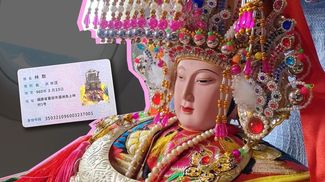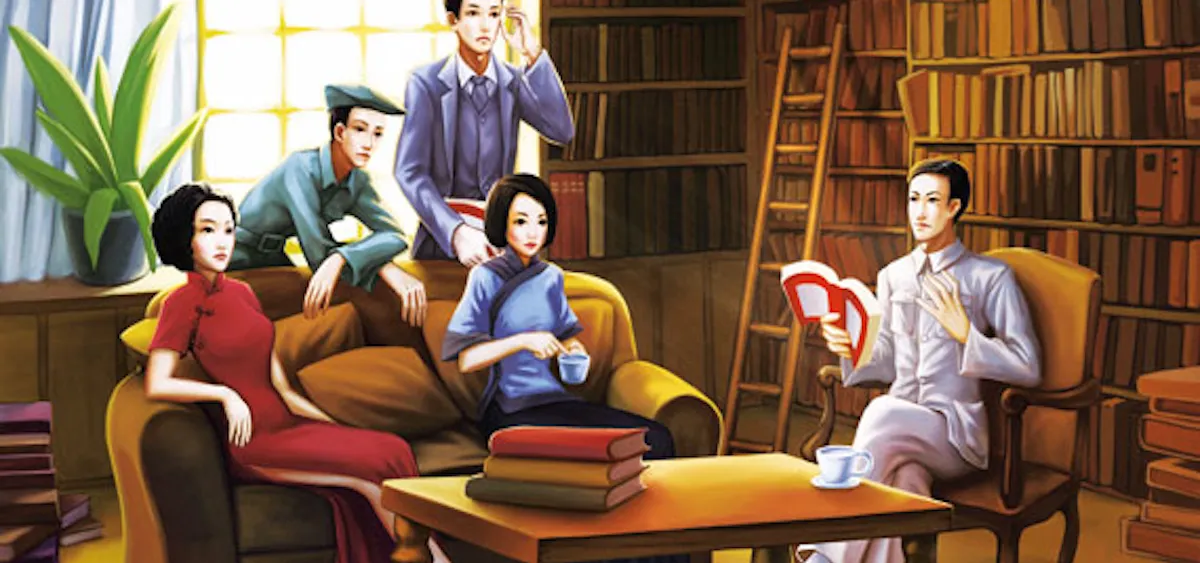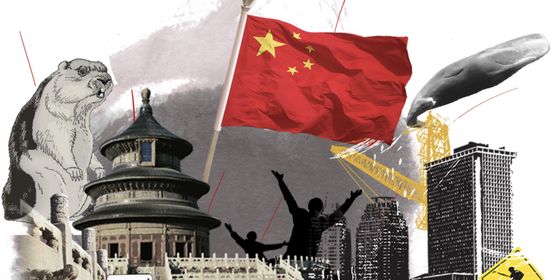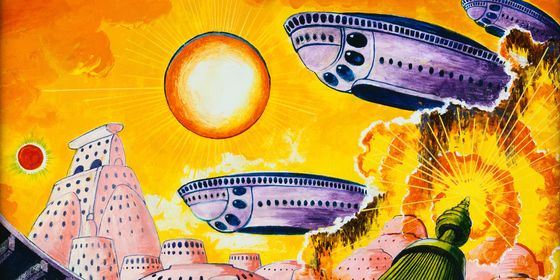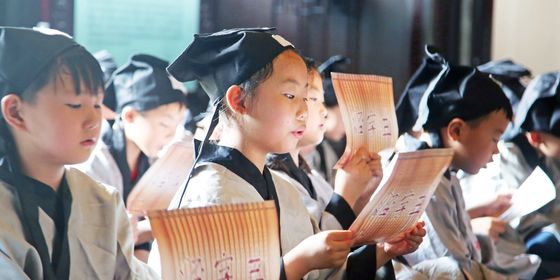It’s a hell of a lot cheaper than a Master’s Degree
For a few decades, the absolute peak of fashion in China was a grey Mao suit or a dreary green uniform. Patriotic home decorations were de rigueur—a portrait or a bust of “the great leader” being quite the thing. Your choice of favored literature was as good as the next comrade’s (probably the “Little Red Book”). Things were so much simpler as a member of the masses, feeling utterly content and faceless. Alas, we are living in the agonizing present where temptations threaten to inflame our vapid vanity. In mainstream society, men are supposed to be rich and successful, women to be rich and pretty. Weibo bloggers flaunt designer handbags, monasteries have bank accounts with 10-digit figures, and the latest phone is a status symbol.
Luckily, intellectualism seems to be on the rise, giving you the perfect excuse to eschew 炫富 (Xuàn fù, showing off one’s wealth) with righteous indignation and satisfy your ego in an alternative and more fulfilling way.Vanity, or 虚荣心 (Xūróng xīn), literally means “the falsely honored heart” in Chinese. If pretending to be rich turns out to be too troublesome, you can always—with the help of this guide—fake intelligence. To 得瑟 (De sè, “show off ” in northeastern dialect) how smart you are, don’t hesitate to be pretentious or snobbish about your taste in art or literature. These gestures will really get the message across. Granted, there’s a big chance you’ll end up being the most detested person in your social circle, but there will also be no lack of simple minded chumps willing to fall for your shtick, proclaiming you 牛B (awesome) from the mountain tops. Before we go any further, remember the motto:
Just because something is popular doesn’t mean it’s good.
Liúxíng de bù yīdìng shì hǎo de.
流行的不一定是好的。
Despising and doubting the value of popular culture is a common symptom of snobbery. In application of the motto, avoid any apparent interest in blockbuster movies, bestselling books, or pop music. Explain by pointing out that there’s still a difference between high culture and low culture. What’s good for the masses clearly would never be good enough for a cultured being such as yourself. Even if you secretly enjoy Tiny Times, take it as a personal insult if anyone ever tries to invite you to watch it.
A: A blockbuster will be in theater this weekend. Shall we go together?
Zhè zhōumò yǒuyī bù dà piān er shàngyìng. Wǒmen yīqǐ qù kàn ba?
这周末有一部大片儿上映。我们一起去看吧?
B: Sorry, I never watch commercial films.
Duìbùqǐ, wǒ cónglái bu kàn shāngyèpiàn.
对不起,我从来不看商业片。
I only watch movies that are meaningful.
Wǒ zhǐ kàn yǒu yìyì de diànyǐng.
我只看有意义的电影。
In fact, you can go as far as claim that:
If something is popular, it must be bad.
Liúxíng de, yīdìng shì bù hǎo de.
流行的,一定是不好的。
Forget that Shakespeare wrote for the peanut gallery; don’t hesitate to bash any popular book about how poorly it was written. It’s a great way to make your peers feel bad about what they choose to read:
A: I recommend this bestseller.
Wǒ tuījiàn zhè běn chàngxiāo shū gěi nǐ kàn.
我推荐这本畅销书给你看。
B: Excuse me, but I prefer something with more depth.
Bù hǎoyìsi, wǒ gèng xǐhuan yǒu shēndù yīdiǎn de shū.
不好意思,我更喜欢有深度一点的书。
So, what fits on the bookcase of a literary snob? For foreign literature, French and German classics are the best, although Russian literature seems to be making a comeback lately. For Chinese literature, avoid contemporary works and focus only on the past—the older the better. Poetry from 3,000 years ago? Perfect! Each of the “Ten Most Difficult Books for Chinese to Finish” (see top ten list at the bottom of page), as recently agreed upon by netizens, should all be on your list of all-time favorites.
My favorite book is Remembrance of Things Past by Marcel Proust.
Wǒ zuì xǐhuan de shū shì mǎ sài ěr·pǔ lǔ sī tè de “zhuīyì sì shuǐ niánhuá”.
我最喜欢的书是马塞尔·普鲁斯特的《追忆似水年华》。
Once familiar with these tips, you should be ready to move on to the next level—how to drop subtle hints that you prefer quality literature—thus are a person of taste—without even mentioning the subject matter. The trick is to use “the Republic style” (民国体 Mínguó tǐ) in your daily conversation. People spoke or wrote like this during the Republic of China period (1912-1949). Frankly, if your listeners can understand what you are talking about, you should adopt an even earlier and more pretentious style, 文言文 (Wényánwén, classic Chinese). However, such ability is lost to most modern ears. The Republic style, on the other hand, features vernacular Chinese, or 白话文 (Báihuàwén), the forerunner of modern Chinese. Although certain elements from classic Chinese were preserved, it’s still accessible to ordinary people. A typical statement about your weekend activity goes like this:
On Sunday, the weekend, together with a friend Mr. A, I made an excursion to the park.
Xīngqí zhī rì, xié you mǒu jūn zuò gōngyuán zhī yóu.
星期之日,偕友某君作公园之游。
If you are a student having a day off of school, you can describe the situation using the Republic style:
Today, school is off. At home without any class, [I am] very bored.
Jīnrì xiào zhōng fàngjià. Kèyú zàijiā, shū wúliáo lài.
今日校中放假。课余在家,殊无聊赖。
Renowned writers from the Republic period are also a good bet. So, drop a few famous lines from time to time, and listeners will be instantly impressed by your skill at sounding like a literary master. Since they all had specific characteristics, you can take your pick of writers, but Lu Xun (鲁迅)’s style is imperative. The distinguished left-wing writer was a leading figure in the Chinese literary circles of the age. Active during the early 20th century, his use of language was distinctive and controversial. In a short story, he
famously wrote:
It’s possible that Kong Yiji was definitely dead.
Dàyuē kǒng yǐjǐ díquè sǐle.
大约孔乙己的确死了。
The paradoxical use of the words “possible” and “definitely” provoked much heated discussion. Some claimed Lu Xun was making a point about societal cruelty leading to the death of character. However, as Lu did not witness the death, the word “possible” is potentially legitimate. The more cynical believe it was a simple mistake. Literary snobs, naturally, prefer the first interpretation, and will airily incorporate the sentence into their daily conversation.
A: Did he come to the party at all?
Tā dàodǐ yǒu méiyǒu lái jùhuì?
他到底有没有来聚会?
B: It’s possible that he definitely did not.
Dàyuē díquè méiyǒu lái.
大约的确没有来。
It’s possible that I definitely have to work overtime today.
Wǒ jīntiān dàyuē díquè yào jiābānle.
我今天大约的确要加班了。
Another famous description Lu used in his essay raised a similar discussion. He wrote:
In my back garden, two trees from outside of the wall are visible; one is a date tree, and the other is a date tree as well.
Zài wǒ de hòu yuán, kěyǐ kànjiàn qiáng wài yǒu liǎng zhū shù, yī zhū shì zǎo shù, hái yǒuyī zhū yěshì zǎo shù.
在我的后园,可以看见墙外有两株树,一株是枣树,还有一株也是枣树。
Some literary critics believed such tautology to be the reflection of Lu’s heavy heart and depression, others just make fun of the words because they are unnecessary. Using the same format, you can express your feelings like the great writer himself.
She only does two things every day; one is to play video games, and the other is to play video games as well.
Tā měitiān zhǐ huì gàn liǎng jiàn shìqíng, yī jiàn shì wán er yóuxì, lìng yī jiàn yěshì wán er yóuxì.
她每天只会干两件事情,一件是玩儿游戏,另一件也是玩儿游戏。
He only spoke two words, one was “lie”, and the other was “lie” as well.
Tā zhǐ shuōguò liǎng jù huà, yījù shì huǎngyán, lìng yījù yěshì huǎngyán.
他只说过两句话,一句是谎言,另一句也是谎言。
Last but not the least, apply a direct quote to a situation at any time to seem snobbish; so remember to save Lu’s most famous statement for future use:
There were no road signs when the earth began; they were made by people treading on the ground.
Zhè shìjiè shàng běn méiyǒu lù, zǒu de rén duōle, yě biàn chéngle lù.
这世界上本没有路,走的人多了,也便成了路。
Whether it’s talking about art and literature or just daily chit-chat, this should get you started on your journey to becoming the most
infuriating person in any Chinese conversation. Don’t worry, chances are, everyone else will be doing it too.
Ten most difficult books for Chinese to finish
Recently, a Chinese publishing house surveyed about 3,000 readers on books that are considered the most difficult to finish, ranking them accordingly. So, off you go then. Remember to let us know when you have read them all…
1. Dream of the Red Chamber 《红楼梦》
2. One Hundred Years of Solitude 《百年孤独》
3. Romance of the Three Kingdoms《三国演义》
4. Remembrance of Things Past《追忆似水年华》
5. Walden《瓦尔登湖》
6. Outlaws of the Marsh《水浒传》
7. The Unbearable Lightness of Being《不能承受生命之轻》
8. Journey to the West《西游记》
9. How the Steel Was Tempered《钢铁是怎样炼成的》
10. Ulysses《尤利西斯》

